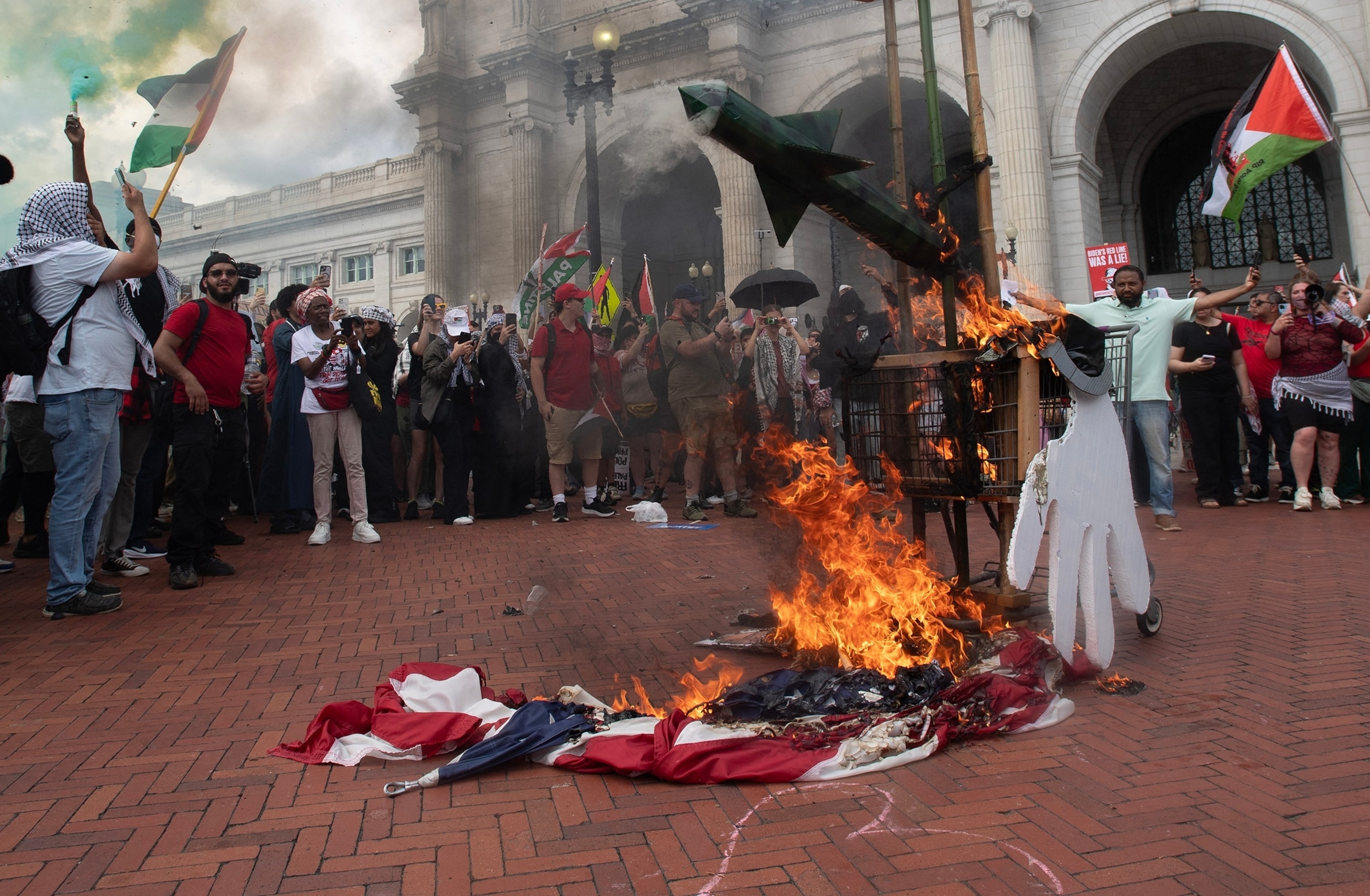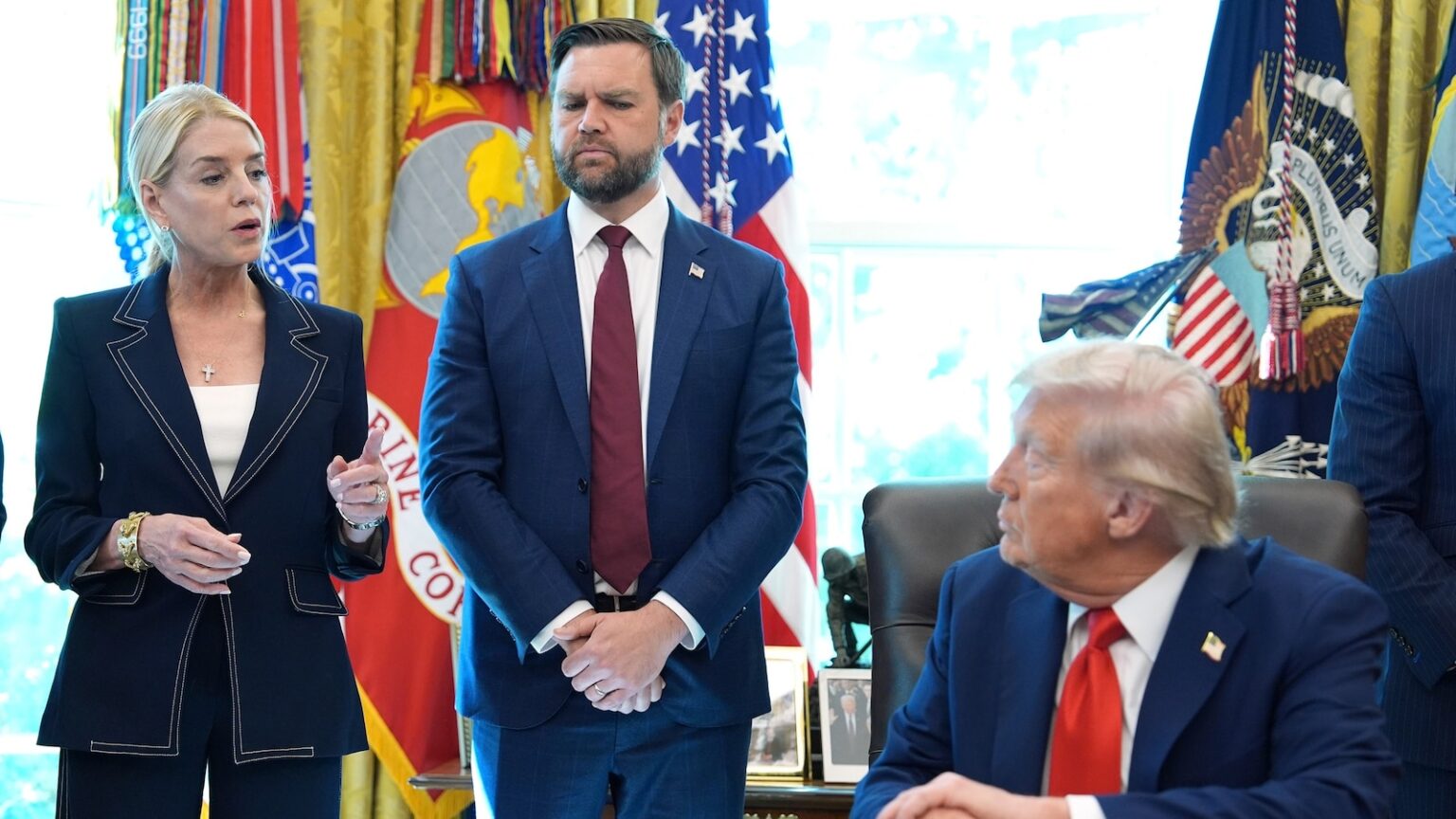President Trump on Monday signed an executive order directing the Justice Department to “prioritize” prosecution of Americans who engage in “acts of American flag desecration,” activity which the U.S. Supreme Court has previously ruled is protected by the First Amendment.
To get around the constitutional roadblock, which the order acknowledges, Trump instead directs government attorneys to aggressively charge flag burners with other crimes, such as destruction of property, disorderly conduct, aiding and abetting, and local open burning restrictions.
Declaring the flag “the most sacred and cherished symbol of the United States of America,” the presidential order calls destruction of the flag in public – by burning or other means – “uniquely offensive and provocative” and “may incite violence and riot.”
“The Court has never held that American Flag desecration conducted in a manner that is likely to incite imminent lawless action or that is an action amounting to fighting words’ is constitutionally protected,” the order reads.
Neither the president nor the text of the order identified any examples of recent flag burning that have incited violence or evidence that the controversial act poses a serious risk. There is no nationwide data on frequency of U.S. flag burnings, but the cases are considered rare.
A view of the U.S. Supreme Court, July 1, 2024.
Kevin Mohatt/Reuters
The landmark 1989 high court decision in Texas v. Johnson declared for the first time that the government cannot criminalize destruction of an American flag when done as an act of expression. It also explicitly dismissed the same arguments about incitement — an exception to First Amendment protections — advanced by Trump.
Flag burning does not fall within “that small class of ‘fighting words’ that are likely to provide the average person to retaliation and thereby cause a breach of the peace,” wrote Justice William Brennan in the 5-4 majority opinion. “No reasonable onlooker would have regarded Johnson’s generalized expression of dissatisfaction with the policies of the Federal Government as a direct personal insult or an invitation to exchange fisticuffs.”
“If there is a bedrock principle underlying the First Amendment,” Brennan wrote, “it is that the government may not prohibit the expression of an idea simply because society finds the idea itself offensive or disagreeable.”
Brennan was joined in the decision by conservative icon Justice Antonin Scalia, overturning laws in 48 states that had outlawed flag burning.
Gregory Johnson, the plaintiff in the case, had been convicted of violating a Texas law against flag burning and received a 1-year jail sentence and $2000 fine. He staged a protest outside Dallas City Hall during the 1984 Republican National Convention. No one was injured or threatened with violence during the demonstration.
Trump now appears eager to have the court revisit the scope of its ruling, pledging to “pursue litigation to clarify the scope of the First Amendment exceptions in this area.”

Protesters burn an American Flag outside of Union Station following Israeli Prime Minister Benjamin Netanyahu’s address during a joint session of congress, in Washington, July 24, 2024.
Matthew Hatcher/AFP via Getty Images
Last year, the Trump Justice Department prosecuted a North Carolina man caught burning an American flag in front of Union Station during a protest against the visiting Israeli Prime Minister Benjamin Netanyahu.
Michael Snow Jr. was charged with and convicted of destruction of federal property, as the flag was taken from a pole owned by the National Park Service. A judge sentenced him to 40 hours of community service and a $525 fine.
“All over the country, they’re burning flags,” Trump said Monday without providing any evidence of the claim. “I guess it was a 5 to 4 decision, they called it freedom of speech. But there’s another reason, which is perhaps much more important, it’s called death. Because what happens when you burn a flag is the area goes crazy.”
Legal scholars and civil liberties experts said any government prosecutions of flag burning under the order could be on shaky ground.
“While people can be prosecuted for burning anything in a place they aren’t allowed to set fires, the government can’t prosecute protected expressive activity — even if many Americans, including the president, find it ‘uniquely offensive and provocative,'” said Bob Corn-Revere, chief counsel at the Foundation for Individual Rights and Expression, a nonpartisan advocacy group.
“You don’t have to like flag burning. You can condemn it, debate it, or hoist your own flag even higher,” wrote Corn-Revere in a statement. “The beauty of free speech is that you get to express your opinions, even if others don’t like what you have to say.”
Even Justice Scalia, who cast the deciding vote in the case, decades later defended the precedent, saying the text of the Constitution is unequivocally clear. “If it were up to me, I would put in jail every sandal-wearing, scruffy-bearded weirdo who burns the American flag,” he said in 2015. “But I am not king.”
Attorney General Bondi said that the administration would protect the freedom of speech in their enforcement efforts. “We’ll do that without running afoul of the First Amendment,” she said.
The post Trump says flag burning incites violence and riot. A Supreme Court ruling cast doubt on that claim. appeared first on abcnews.go.com

